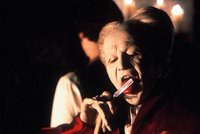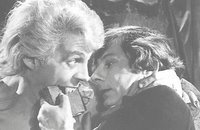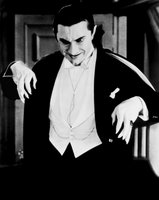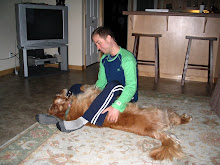Dracula
 More interesting to me, however, is the way this movie works in comparison to other entries in the body of vampire literature and movies. I wouldn't call myself a connoisseur of the genre, not even an enthusiast really... I've read a couple of the books, and seen some of the movies. I definitely appreciate the Dracula novel, and Coppola's take on it, as well.
More interesting to me, however, is the way this movie works in comparison to other entries in the body of vampire literature and movies. I wouldn't call myself a connoisseur of the genre, not even an enthusiast really... I've read a couple of the books, and seen some of the movies. I definitely appreciate the Dracula novel, and Coppola's take on it, as well.
 What I really liked about The Fearless Vampire Killers is how it drew out some of the sexual themes of the vampire myth, especially the homosexual energy that pervades the archetypal symbolism but is conspicuously absent in much of the body of work (Neil Jordan's Interview with the Vampire being an obvious exception). I think there's been something of a reinterpretation of the myths in the last few decades, or maybe an emphasis on different facets of the myth.
What I really liked about The Fearless Vampire Killers is how it drew out some of the sexual themes of the vampire myth, especially the homosexual energy that pervades the archetypal symbolism but is conspicuously absent in much of the body of work (Neil Jordan's Interview with the Vampire being an obvious exception). I think there's been something of a reinterpretation of the myths in the last few decades, or maybe an emphasis on different facets of the myth.
 In Tod Browning's original classic movie, for example, the "monster hiding behind the façade of bourgeois respectability" is central. Coppola returns the primacy of the love story and the erotic energy of the vampire; he also has a lot of FEMALE homoeroticism, of course, but (in my opinion) Stoker's novel is much more interested in the male homosexuality than the female.
In Tod Browning's original classic movie, for example, the "monster hiding behind the façade of bourgeois respectability" is central. Coppola returns the primacy of the love story and the erotic energy of the vampire; he also has a lot of FEMALE homoeroticism, of course, but (in my opinion) Stoker's novel is much more interested in the male homosexuality than the female.
Writing when he was, of course, this theme and the images he used to pursue it were well cloaked. It was in some later analyses of the text that people really started to delve into what he was exploring. One significant example in the story is when Lucy is dying, and requires constant blood transfusions; the men all take turns giving her their plasma. She has become a conduit through which all of these men can share their vital bodily fluids.
Another way Stoker explored the theme was in the very way he under-emphasized it; it gains significance in its absence. The perfect example is the respective deaths of Lucy and Count Vlad. When the boys kill the vampire Lucy, it takes over three pages and is described in gruesome detail. The last third of the book loses all its energy as they pursue Dracula over land and water.They finally catch up to him, and the ultimate death plays out like this:
"But, on the instant, came the sweep and flash of Jonathan's great knife. I shrieked as I saw it shear through the throat. Whilst at the same moment Mr. Morris's bowie knife plunged into the heart."
That's it. The whole book builds to this moment, and it takes 36 words to complete.
The significance of this curious decision becomes clear when viewed through the spectrum of the Victorian era, and what you could and could not get away with writing about. It was bad enough to describe the graphic penetration of a woman by a man... but of a man penetrating another man? No way. So Stoker glosses over the one and, if anything, OVER describes the other.
The other interpretation of this fact in a sexual light is to see what a female vampire represents: a strong sexual woman who is fully aware of, and in control of, her powers. This archetype is one that comes back again and again throughout the history of literature, and is always perceived as a threat to the patriarchy. It reached one of its apexes in the Victorian era.
"...Lucy's eyes in form and color, but Lucy's eyes unclean and full of hell fire, instead of the pure, gentle orbs we knew...Had she then to be killed, I could have done it with savage delight. As she looked, her eyes blazed with unholy light, and the face became wreathed with a voluptuous smile...With a careless motion, she flung to the ground, callous as a devil, the child that up to now she had clutched strenuously to her breast, growling over it as a dog growls over a bone...There was a cold-bloodedness in the act which wrung a groan from Arthur. When she advanced to him with outstretched arms and a wanton smile he fell back and hid his face in his hands."
Lucy is voluptuous and devilish... the opposite of the virgin mother, she actually feeds on small children, devouring their innocent soul with her power and strength. She has gone from virtuous and innocent to promiscuous and degraded... so of course she must be destroyed. Her realization of her powers make her the ultimate threat to male primacy.
It would be very hard for me to believe Stoker wasn't aware of these choices he was making, and I like to think he's satirizing the common attitudes of the era, both about the Jezebel archetype and also the male homoeroticism that was so repressed. Again, this is why I enjoyed The Fearless Vampire Killers; it actively explored this theme with the character of the Count's son, who constantly pursues the young Roman Polanski character. It plays it up for a joke, of course, but it one of the few examples I've seen that even brings up that interpretation of the novel (which is obviously the granddaddy of all vampire narratives and informs any vampire story that has come since).


0 Comments:
Post a Comment
<< Home